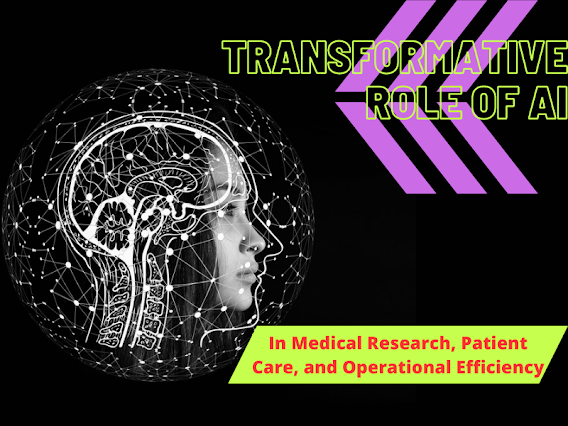
In recent years, the field of healthcare has witnessed a remarkable revolution driven by the integration of artificial intelligence (AI) technologies. From enhancing medical research and patient care to optimizing operational efficiency, AI has proven to be a game-changer. This blog explores the transformative role of AI in these critical aspects of the healthcare industry.
Accelerating Medical Research:
AI has expedited medical research by analyzing vast amounts of data in a fraction of the time it would take human researchers. For instance, AI algorithms can sift through extensive genomic data to identify potential disease markers, aiding in the development of targeted therapies. Machine learning models predict the efficacy of drug candidates, saving years of trial and error in drug discovery. AI-driven simulations and modeling enable researchers to explore complex biological processes and simulate the effects of various interventions, expediting research breakthroughs.
Precision Medicine:
Personalized treatment approaches have gained momentum with AI. By analyzing a patient's genetic makeup, medical history, and lifestyle factors, AI can recommend tailored treatment plans with higher success rates. This approach minimizes adverse effects and maximizes the likelihood of successful outcomes, marking a shift from one-size-fits-all medicine.
Enhanced Diagnostics:
AI-powered diagnostic tools, such as image recognition and natural language processing, have revolutionized disease detection. Radiology and pathology benefit from AI's ability to analyze medical images, aiding in early detection of conditions like cancer. Chatbots and virtual assistants powered by AI assist in triaging patients, providing preliminary diagnoses, and offering medical information.

Predictive Analytics:
AI algorithms can predict disease outbreaks, patient admissions, and even individual patient outcomes by analyzing historical data. Hospitals can proactively allocate resources, staff, and facilities to manage patient influxes effectively. Predictive analytics also assist in identifying patients at risk of deteriorating health, enabling early interventions.
Operational Efficiency and Cost Reduction:
AI streamlines administrative processes, reducing the burden of paperwork and repetitive tasks. Chatbots handle appointment scheduling and answer common queries, freeing up staff to focus on more complex tasks. Supply chain management benefits from AI's ability to predict demand, optimize inventory levels, and minimize wastage.

Remote Monitoring and Telemedicine:
AI-enabled remote monitoring devices and wearables empower patients to manage chronic conditions from the comfort of their homes. These devices track vital signs, medication adherence, and lifestyle factors, sending real-time data to healthcare providers for timely interventions. Telemedicine platforms leverage AI to enable virtual consultations, expanding access to medical expertise, especially in remote areas.
Ethical Considerations and Data Privacy:
While AI offers immense potential, ethical considerations are crucial. Ensuring patient data privacy, transparency in AI algorithms, and unbiased decision-making are paramount. Regulatory frameworks must evolve to address these concerns and ensure responsible AI deployment in healthcare.
Conclusion:
Artificial intelligence has reshaped the landscape of medical research, patient care, and operational efficiency. Its ability to analyze vast datasets, provide personalized treatment, enhance diagnostics, predict outcomes, and streamline operations has opened new avenues for improving healthcare outcomes. As AI technologies continue to evolve, collaboration between healthcare professionals, researchers, technologists, and policymakers will be pivotal in harnessing AI's full potential while upholding patient welfare and ethical standards. The journey towards a smarter, more efficient healthcare future is well underway, and AI is leading the way.
